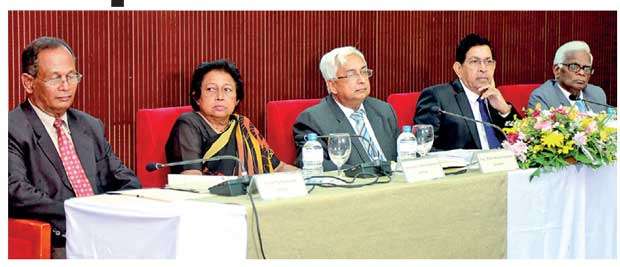18 Jun 2018 - {{hitsCtrl.values.hits}}
 From left: NPC members Dr. Palitha Ekanayake, Prof. Chitra Weddikkara, Chairman Eng. B. Nihal Wickramasuriya, NPC members Christy Perera and M. Vamadevan Pic by Damith Wickremesinghe
From left: NPC members Dr. Palitha Ekanayake, Prof. Chitra Weddikkara, Chairman Eng. B. Nihal Wickramasuriya, NPC members Christy Perera and M. Vamadevan Pic by Damith Wickremesinghe
Sri Lanka is to replace the 12-year old public procurement guidelines by this August with a new set of guidelines, aiming to enhance transparency, accountability and efficiency of the procurement process, while cutting down related costs by almost 10 percent.
Addressing a media briefing last week, the National Procurement Commission (NPC) Chairman Eng. B. Nihal Wickramasuriya said the Commission has already gazetted the new public procurement guidelines on May 9, which is subjected to Parliament approval before August 9 this year.
In a bid to replace the current paper-based procurement with an electronic government procurement (e-GP) system, the NPC has also included necessary guidelines for an e-GP process. The Finance and Mass Media Ministry is currently conducting a feasibility study for the e-GP.
According to him, 98 percent of public procurements in Sri Lanka are paper-based.
Wickramasuriya stressed that e-GP will reduce corruption in the process by minimizing the human intervention while improving accuracy, efficiency, transparency and competition.
He also emphasised that the Open Contracting Data Standard (OCDS) will come into operation following the implementation of e-GP. The OCDS is expected to enable the government to carry on management and analysis of procurement data, improving openness and transparency in public procurement activities.
NPC member, Christy Perera noted that it will require at least 10 years for Sri Lankan authorities to transform the paper-based public procurement processes into a fully-fledged electronic procurement platform.
However, he stressed that the State agencies could publish tenders and tender procedures online in the meantime.
Meanwhile, NPC member, Prof. Chitra Weddikkara highlighted that NPC has also introduced a value engineering system and a technical auditing system to the new guidelines, where the former will help to cut down the cost of procurements by almost 10 percent.
According to the NPC, public procurements amount to approximately 27 percent of government expenditure annually.
The new gazetted guidelines extend to tender boards pertaining to all levels of procurement, whereas current procurement guidelines are limited to Cabinet level procurements.
The NPC has also introduced green procurement, aiming to facilitate the efforts of achieving sustainable goals. Green procurement includes life-cycle costing, different weightages to certain procurements and green labelling.
Wickramasuriya noted that full reports of Technical Evaluation Committees will be made available to public, following the completion of tender processes. The Commission will also investigate and report to the authorities and to the Parliament about genuine stakeholder complaints of stakeholders related to the tender process.
However, Wickramasuriya acknowledged that NPC is unable to block awarding of tenders directly to parties which are found guilty by investigations.
Meanwhile, he further said the NPC expects the gazetted public guidelines to reach Parliament this week via the Prime Minister’s Office. The NPC had earlier submitted the gazetted guidelines to the Presidential Secretariat.
The NPC was established under the 19th Amendment to the Constitution in the latter part of 2015, with the aim of streamlining the existing public procurement system.
According to the gazette, the new procurement guidelines will replace all previous procurement guidelines, circulars and directives within 30 days following parliamentary approval.
The NPC noted that the 30-day window is aimed at making room for any amendment pertaining to the guidelines.
According to the NPC, this would be the first time where procurement guidelines would be published as a constitutional requirement, thereby getting the cover of the supreme law of the country.
The new guidelines were prepared through an extensive consultation process with the support of Asian Development Bank, World Bank (WB) and USAID.
The five-member NPC was set up under the 19th Amendment to the Constitution, under Chapter XIX B. (NF)
18 Nov 2024 4 minute ago
18 Nov 2024 19 minute ago
18 Nov 2024 1 hours ago
18 Nov 2024 1 hours ago
18 Nov 2024 1 hours ago